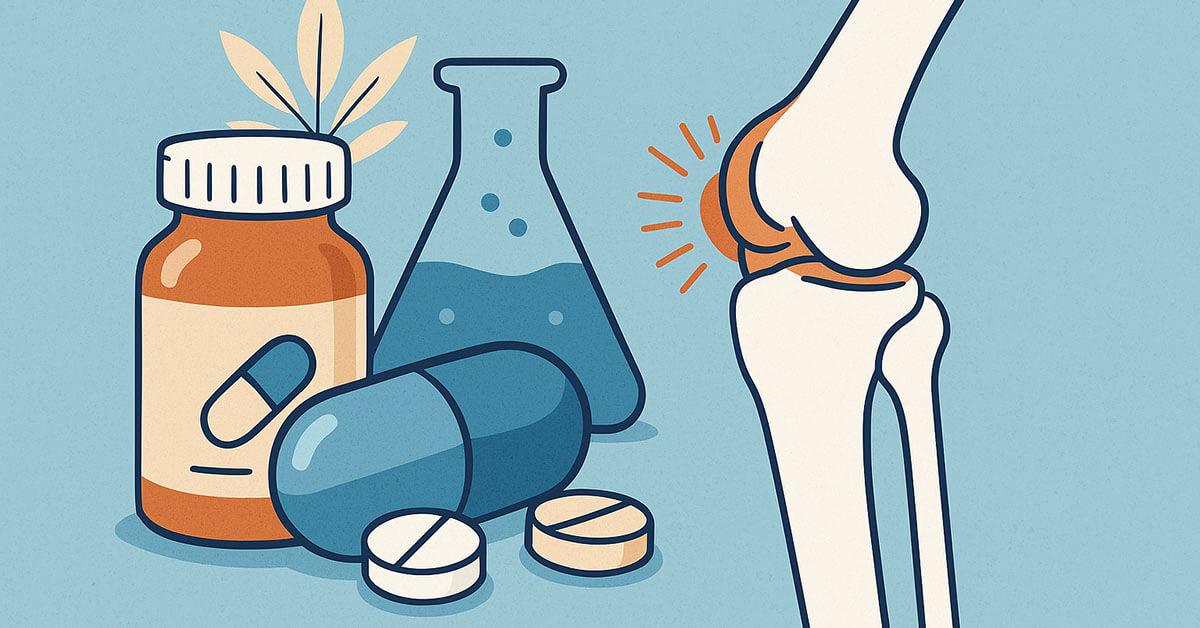
Supplements for Arthritis: What Works, What Doesn’t

Arthritis is one of the most common chronic conditions worldwide, affecting more than 350 million people.
Arthritis is an umbrella term covering 100+ joint conditions. Here are the main types most readers mean when they say “arthritis”:
- Osteoarthritis (OA) — Degenerative “wear‑and‑tear” of cartilage causing pain and stiffness, especially in knees, hips, and hands.
- Rheumatoid arthritis (RA) — Autoimmune inflammation of the synovium; typically symmetric joint pain, swelling, and morning stiffness.
- Psoriatic arthritis (PsA) — In people with psoriasis; can involve joints, tendons (enthesitis), and sausage‑like swelling of fingers/toes (dactylitis).
- Gout — Sudden, very painful attacks from uric acid crystal buildup, often starting in the big toe.
- Ankylosing spondylitis (axial spondyloarthritis) — Inflammatory arthritis of the spine and sacroiliac joints; can lead to spinal stiffness/fusion.
Other notable forms include lupus arthritis (SLE) and juvenile idiopathic arthritis (JIA), among many others.
What Causes Arthritis and Can It Be Reversed?
Arthritis is not a single disease but a group of conditions with different causes. Osteoarthritis usually develops when cartilage breaks down over time due to aging, injury, or excess weight, leading to “wear and tear” in the joints. Rheumatoid arthritis and other inflammatory types are driven by autoimmune processes, where the immune system mistakenly attacks the joint lining. Gout results from uric acid crystals building up inside joints, while conditions like psoriatic arthritis link to skin inflammation and genetics.
Currently, arthritis cannot be fully reversed because joint damage is often permanent. However, treatments—including medications, lifestyle changes, and in some cases supplements—can slow progression, reduce inflammation, and significantly improve quality of life. Early diagnosis and management are key to preserving joint function.
With prescription medications often carrying side effects, it’s no surprise that millions of people turn to supplements in search of relief. But the supplement market is a mixed bag. Some products are backed by solid science, while others are little more than expensive placebos.
So, which supplements for arthritis actually work—and which ones don’t live up to the hype? Let’s dive in.
Arthritis Supplements Cheat Sheet
👉 You can use this arthritis supplements cheat sheet for a clear overview of evidence. It highlights effective supplements, emerging options, and those with little or no proven benefit — at least not yet.
| Supplement | Best for | Evidence | Typical dose | Safety notes | |
|---|---|---|---|---|---|
| Effective (best evidence) | |||||
| Glucosamine sulfate | OA (knee) | A | 1,500 mg/day (sulfate; not HCl) | May affect glucose; GI upset possible | |
| Chondroitin sulfate | OA | A− | 800–1,200 mg/day | Blood‑thinner caution; GI upset | |
| Curcumin | OA pain & stiffness | B+ | 500–1,000 mg/day (with piperine) | Bleeding risk with anticoagulants | |
| Omega‑3 (EPA/DHA) | RA stiffness | A− | 2–3 g/day EPA+DHA | Bleeding risk at high doses; fishy aftertaste | |
| Boswellia serrata | OA pain/function | B | 100–250 mg/day 5‑Loxin® (30% AKBA) | GI upset; anticoagulant caution | |
| Collagen (UC‑II®) | OA/RA mobility | B | 40 mg/day (undenatured type II) | Generally well tolerated | |
| Promising (more research needed) | |||||
| Collagen peptides (type I/III) | OA comfort | C+ | 5–10 g/day (hydrolyzed) | Protein source; rare GI upset | |
| Resveratrol | RA (adjunct) | C | 100–500 mg/day | Anticoagulant caution; GI upset | |
| EGCG (green tea) | Inflammation (theoretical) | C | 200–400 mg/day EGCG | Liver caution with high doses | |
| Quercetin | OA/RA (early data) | C | 500–1,000 mg/day | May interact with antibiotics | |
| SAM‑e | OA pain (mixed) | C | 400–1,200 mg/day | May affect mood/SSRIs; GI upset | |
| Hyaluronic acid (oral) | OA (limited evidence) | C− | 120–240 mg/day | Well tolerated | |
| Ineffective or insufficient evidence | |||||
| MSM | OA (claims) | D+ | — | Small, inconsistent trials | |
| Glucosamine HCl | OA | D | — | No benefit vs placebo in RCTs | |
| Devil’s claw | General joint pain | D | — | Weak, non‑specific evidence | |
| Vitamin D (normal levels) | OA symptoms | D | — | No symptom relief without deficiency | |
| Shark cartilage | OA/RA (claims) | D | — | Repeatedly negative/ineffective | |
🔄 Don’t hesitate to bookmark this page — we update the table whenever new and significant research on arthritis supplements is published.
Legend
- Evidence grades: A = Strong evidence (multiple high-quality RCTs or meta-analyses), B = Good evidence (some RCTs but smaller or mixed), C = Limited/preliminary evidence, D = Ineffective or no convincing evidence.
- Best for: OA = Osteoarthritis, RA = Rheumatoid Arthritis.
- Typical dose: Common amounts used in clinical studies; individual needs may vary.
- Safety notes: General precautions; always consult a healthcare professional.
Arthritis Supplements That Work: Strong Scientific Evidence
Scientific studies highlight a few supplements with solid evidence for arthritis relief. Here’s what works best according to current research:
1. Glucosamine Sulfate
AGlucosamine sulfate is one of the most studied supplements for osteoarthritis, particularly of the knee. Unlike glucosamine hydrochloride (which has shown little effect), the sulfate form appears to help preserve joint space and reduce pain.
Read our complete guide to Glucosamine benefits
2. Chondroitin Sulfate
A−Often paired with glucosamine, chondroitin sulfate has shown benefits in reducing joint pain and improving mobility. A large multicenter trial even found the combination nearly as effective as celecoxib, a prescription anti-inflammatory.
See Dosage details for chondroitin
3. Omega-3 Fatty Acids (Fish Oil)
A-Fish oil rich in EPA and DHA is a staple in rheumatoid arthritis management. These fatty acids lower inflammation, improve morning stiffness, and can reduce reliance on pain medication.
Full article: Omega-3 supplement benefits
4. Curcumin (Turmeric Extract)
B+Curcumin, the active compound in turmeric, has well-documented anti-inflammatory properties. Clinical trials suggest it can reduce pain and stiffness in osteoarthritis, sometimes performing as well as NSAIDs without the gastrointestinal risks.
Learn more about the benefits of Curcumin
5. Boswellia Serrata
BAlso known as Indian frankincense, Boswellia contains boswellic acids that inhibit enzymes involved in inflammation. Several randomized controlled trials show it reduces pain and enhances mobility in knee osteoarthritis.
Dosage, side effects and benefits of Boswellia
6. Collagen (Undenatured Type II, UC-II)
BUC-II, a specific form of undenatured type II collagen, has shown promise in reducing joint pain and improving flexibility in both osteoarthritis and rheumatoid arthritis. Unlike hydrolyzed collagen powders, UC-II seems to work via an immune-tolerance mechanism.
Read more about Collagen supplement
Promising Arthritis Supplements
Some supplements show promise but need more rigorous research before they can be recommended with confidence:
Collagen peptides type I/III
C+These are the most common forms of collagen found in skin and connective tissue. Early trials suggest that oral collagen peptides may reduce stiffness and support joint cartilage repair, particularly in osteoarthritis. However, most studies are small, and the optimal dose or long-term benefits are not yet established.
Resveratrol
CResveratrol, a polyphenol found in grapes and red wine, has strong antioxidant and anti-inflammatory effects in lab and animal studies. Some small human trials hint at benefits for reducing inflammation in rheumatoid arthritis. Still, clinical data remain scarce, and supplementation levels used in studies are much higher than typical dietary intake.
Green tea extract (EGCG)
CEpigallocatechin gallate (EGCG), the main catechin in green tea, has shown the ability to reduce inflammatory cytokines and cartilage breakdown in preclinical studies. While animal models look encouraging, human evidence is limited to a few small trials with mixed results. Larger studies are needed before recommendations can be made.
Quercetin
CThis plant flavonoid, abundant in onions and apples, demonstrates anti-oxidant and anti-inflammatory activity. Early clinical work suggests it might ease stiffness and inflammatory markers in arthritis, but the research base is still narrow. Standardized dosing protocols and long-term safety data are lacking.
SAM-e (S-adenosyl-L-methionine)
CSAM-e is a naturally occurring compound involved in methylation and neurotransmitter synthesis. Some trials from the 1990s suggested it could reduce pain and improve mobility in osteoarthritis, with effects similar to NSAIDs but fewer side effects. More recent, large-scale studies are missing, so confidence in its role remains limited.
Hyaluronic Acid (oral)
C-Hyaluronic Acid injections are widely used and supported for knee osteoarthritis symptom relief, improving lubrication inside the joint. Oral supplements, however, are far less studied, and current data suggest they may not deliver enough active compound to the joint to produce consistent benefits. Evidence is still weak compared to injections.
What Probably Doesn’t Work: Supplements with Weak or No Evidence
Some arthritis supplements remain popular, but, unfortunately, current research suggests they may not quite deliver the promised relief:
MSM (Methylsulfonylmethane)
D+MSM is often combined with glucosamine and chondroitin, and while it may have mild anti-inflammatory properties, high-quality evidence is lacking. Most studies are small and inconsistent.
Glucosamine Hydrochloride
DUnlike the sulfate form, glucosamine hydrochloride has consistently failed to show benefit in osteoarthritis trials. Unfortunately, it’s still widely sold, often confusing consumers.
Devil’s Claw (Harpagophytum procumbens)
DThis African herb has been used traditionally for joint pain. Some studies suggest modest benefits, but results are inconsistent and often not specific to arthritis.
Vitamin D
DVitamin D is crucial for bone health, and supplementation is essential if you’re deficient. However, taking high doses of vitamin D does not directly improve arthritis symptoms in people with normal levels.
Shark Cartilage
DOnce heavily marketed as a “joint protector,” shark cartilage has repeatedly failed in clinical trials. Today, most experts consider it ineffective for arthritis.
Safety and Precautions
Supplements are often perceived as harmless, but they can interact with medications and cause side effects.
- Blood thinners: Fish oil, curcumin, and Boswellia can increase bleeding risk.
- Autoimmune conditions: Collagen and certain herbal extracts may stimulate the immune system.
- Quality concerns: Unlike prescription drugs, supplements are not tightly regulated. Choosing third-party tested products is essential.
Always consult a healthcare provider before starting a new supplement—especially if you’re already on medication for arthritis.
Conclusion: Choosing the Right Supplements for Arthritis
Supplements are not magic bullets, but some can make a meaningful difference when combined with lifestyle strategies like exercise, weight management, and a healthy diet.
- Most evidence-backed: Glucosamine sulfate, chondroitin, curcumin, omega-3s, Boswellia, and UC-II collagen.
- Likely ineffective: MSM, shark cartilage, glucosamine hydrochloride, and high-dose vitamin D without deficiency.
- Promising but unproven: Resveratrol, quercetin, collagen peptides, and green tea extract.
If you’re considering supplements for arthritis, focus on those backed by science, be wary of exaggerated claims, and always check with your doctor before starting. The information provided on this page is for informational purposes only and has not been reviewed or validated by a medical professional.
FAQ about Arthritis
Can young people get arthritis?
Yes. Arthritis isn’t only a disease of aging. Children and young adults can also be affected, especially with juvenile idiopathic arthritis, early rheumatoid arthritis, psoriatic arthritis, gout, or ankylosing spondylitis. Early diagnosis is important to protect joint function.
What causes arthritis and can it be reversed?
Arthritis has many causes: cartilage wear in osteoarthritis, autoimmune attacks in rheumatoid arthritis, uric acid crystals in gout, or genetic and inflammatory factors. It cannot be fully reversed, but treatments and lifestyle changes can slow progression, reduce pain, and improve mobility.
Which supplements actually work for arthritis?
Supplements with the best evidence include glucosamine sulfate, chondroitin, curcumin (turmeric extract), omega-3 fatty acids, Boswellia serrata, and undenatured type II collagen (UC-II). These may reduce pain, stiffness, and improve function. Always consult a healthcare professional before starting supplements.
Which arthritis supplements probably don’t work?
Supplements with weak or inconsistent evidence include MSM, SAM-e, devil’s claw, oral hyaluronic acid, and vitamin D if levels are already normal. Glucosamine hydrochloride, unlike the sulfate form, has repeatedly failed in trials and is not considered effective for arthritis relief.
Are arthritis supplements safe with medications?
Some supplements can interact with medications. Fish oil, curcumin, and Boswellia may increase bleeding risk when taken with anticoagulants. Others may affect immune-suppressing drugs or NSAIDs. Always check with a doctor or pharmacist before combining arthritis supplements with prescribed treatments.
How long do supplements take to work for arthritis?
Supplements usually take several weeks before showing benefits. In clinical studies, 4 to 12 weeks is common for glucosamine, chondroitin, or omega-3s. Effects vary by individual, and progress should be reassessed regularly with a healthcare professional to decide whether to continue.
Can diet and exercise help arthritis?
Yes. Weight loss, a Mediterranean-style diet, and low-impact exercise like swimming or cycling can ease arthritis pain and protect joints. Strength training improves stability, while good sleep and stress management reduce inflammation. Lifestyle changes often complement medical and supplement treatments.
This article was originally published on Stackbb, your trusted source for science-based supplement guides.











